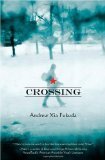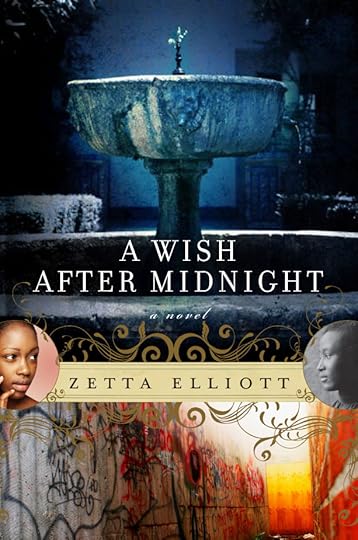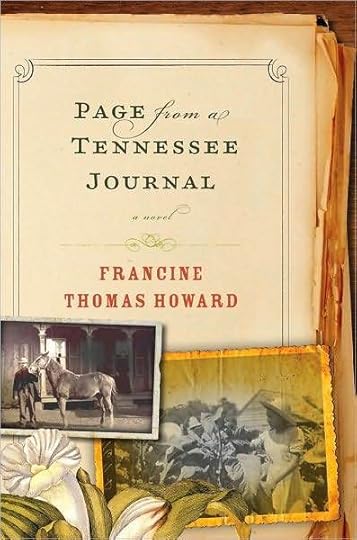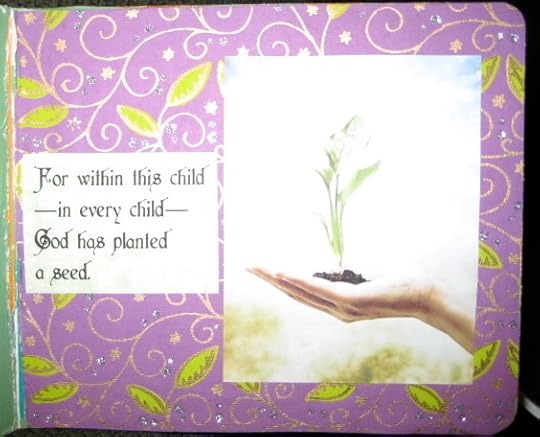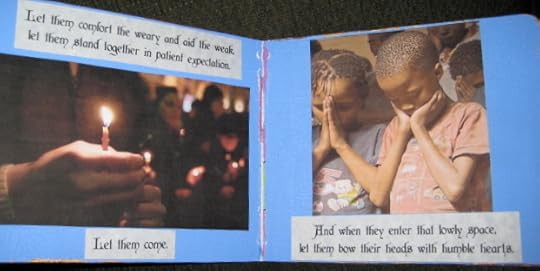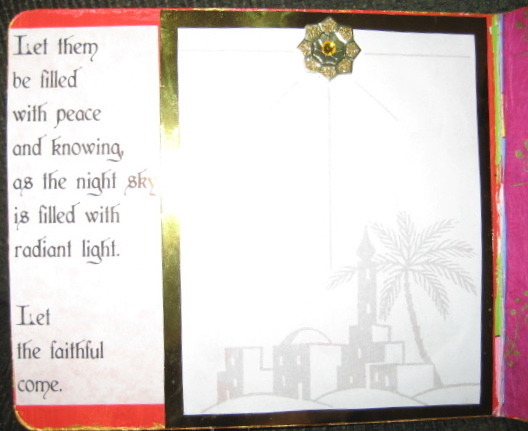Zetta Elliott's Blog, page 98
December 28, 2010
new work
 The universe is clearly on my side—or on the side of my new novel! On Sunday we got hit with a blizzard and when I woke up Monday morning, I had NO internet access and NO cable. What's a girl to do with no web and no TV? Write, of course. I'm past the 9000-word mark on Ship of Souls and thought I'd share a little with the world. My friend Marvin spent part of his Christmas Eve emailing me German curse words—I needed to know how Nyla would say, "Keep your filthy effing hands off me, you effing prick!" If you happen to speak German, let me know if this translation works for you.
The universe is clearly on my side—or on the side of my new novel! On Sunday we got hit with a blizzard and when I woke up Monday morning, I had NO internet access and NO cable. What's a girl to do with no web and no TV? Write, of course. I'm past the 9000-word mark on Ship of Souls and thought I'd share a little with the world. My friend Marvin spent part of his Christmas Eve emailing me German curse words—I needed to know how Nyla would say, "Keep your filthy effing hands off me, you effing prick!" If you happen to speak German, let me know if this translation works for you.
Nyla's a sculpture made of onyx and silver. She wears skintight clothes—mostly black—with strategically placed holes held together by safety pins. She came to school one day with a full head of hair; the next day, the sides and back of her head were shaved, leaving a silky horse's mane on top of her head. Nyla flipped it to the side so a curtain of black hair fell over her right eye. Next day the mane was cropped short, spiked, and streaked with red. I can't even count all the piercings Nyla's got. Rings loop up the outside of her ears and huge black plugs fill her earlobes. She's got both eyebrows pierced, a diamond stud in her nose, and a silver ball that rests under her lower lip. I think her tongue might be pierced, too, but I'm not sure 'cause Nyla's never spoken to me.
One day this creep slipped his arm around her waist as she walked down the hall and Nyla threw him against the lockers and cursed him out: "Du Drecksack! Nimmt Dein dreckige Finger weg Du schwanz." That's right—Nyla cursed him out in German. He's lucky she didn't slug him—with all those silver rings on her fingers, she'd have left a serious dent in that prettyboy's face. Nobody messes with Nyla. She's beautiful, but she's fierce.
On Thursday I come out of the lunch line with my tray of crappy food and Nyla smiles at me. That's right—at me. I smile back and then Nyla nods at the empty stretch of bench to her left. To her right is a loud group of misfits, all of whom seem to belong around Nyla. At first I think it must be a mistake—is Nyla really inviting me to sit next to her, or is she just stretching her neck? I don't want to look like a total reject, but Nyla's eyes are locked on mine and her smile grows wider as I start walking over to her table.
"Hey, D. Grab a seat," she says.
I know I'm smiling like an idiot, but I can't think of anything cool to say. I take a seat next to Nyla and try to look at the other kids she's hanging with. Regine's a track star. Melvin rules at chess. A couple of kids are in the drama club, and the others—combined—have almost as many piercings as Nyla. As soon as Nyla opens her mouth, they all quiet down and wait to hear what she's going to say. "Hey, everybody—this is D."
The other kids turn and look at me. Some smile, some nod, some say "hey," and one girl with blue extension braids gives me a salute. Then a seventh-grader with the biggest Afro I've ever seen points at me and says, "Hey—I know you." I shove at least half my corn dog into my mouth so I don't have to say anything. I'm pretty sure that sitting next to Nyla doesn't come with automatic immunity from insults.
"You're in the Math Club," he says. When I nod, he goes on. "My sister says you're, like, some kind of kid genius—a total Math freak!"
I look down at the carton of milk and bowl of canned pineapple on my tray. Aside from Nyla, these kids aren't exactly what I would call "cool." But they clearly know and like one another—they're friends. Which puts me on the outside. I brace myself for the usual nerd jokes.
Then Nyla slips her arm around my shoulder. "A Math freak, huh? Then it's official—you're one of us, D."
I smile at Nyla but I'm not really sure how to feel. Should I be proud that I belong with a bunch of self-proclaimed freaks? Or should I try to salvage my social reputation by getting up and sitting somewhere else—even if that means eating alone? I finally decide that I'd rather be seen with the wrong kind of kids than be totally invisible.
A skinny kid wearing preppy clothes suddenly whispers, "Hottie alert!" and everyone at the table quiets down. I'm so busy looking around for a cute girl that I don't notice Keem's heading over to our table.
"Hey, D. What's up?"
I nearly choke on a chunk of pineapple but manage to cover my mouth before a piece of half-chewed fruit flies out and lands on Keem's new kicks. I feel like I must be dreaming—two of the most popular kids in school talking to me on the same day! "Not much," I stammer nervously. "Just having lunch."
Keem stands there awkwardly. He glances at Nyla but she's flicking a bottle cap along the tabletop. The girl with the blue braids watches the cap zoom right off the end of the table and yells, "SCORE!"
Keem finally gives up on trying to make Nyla notice him. "See you later, then. Four o'clock, right?"
"Right. I'll meet you in front of the library."
Keem nods, glances at Nyla one last time, and then walks away. Crushed.
I turn to Nyla and find her watching Keem's back. "Friend of yours?" she asks with her eyes still glued on Keem.
"Tutee," I say before cramming all the remaining pineapple into my mouth. I don't want to talk about Keem.
The kid with the giant Afro says, "Two tea? What's that mean?"
"I'm tutoring him in Math. I'm his tutor, he's my tutee."
Afro-kid nods like he's impressed. "What'd I tell you? The kid's a Math genius."
A skinny kid cradling a skateboard says, "Yeah—and look what they make him do: teach the dumb jocks how to count to ten!"
"Keem's not dumb." I'm not sure why I said that, but it's too late to take it back now.
Nyla turns to the skater kid. "What's the Freak's Golden Rule, Jamal?"
He drops his eyes and mumbles, "Don't be a prick." Then he looks at me and says, "Sorry I dissed your friend, D."
I'm about to say, "Keem's not my friend" when a girl with a shaved head and a bolt through her nose says, "My brother plays ball in the park with Keem. He gets mad respect—on and off the court."
The girl with blue braids looks straight and Nyla and says, "He also gets any girl he wants."
Nyla sucks her teeth, but her eyes find Keem sitting with the other jocks on the far side of the cafeteria. "We'll see about that," she says, then gets up and carries her tray over to the trash.
The noise level in the cafeteria seems to drop a notch as Nyla walks down the main aisle and out into the schoolyard. Some of the freaks get up and follow their leader. Others stay and finish the crappy school lunch. A quiet girl with long locks slides along the bench and asks if I can help her with her math homework. I say "sure" and think maybe I really do belong here with the rest of these outcasts.








December 25, 2010
a holiday tradition
Ok, this isn't MY holiday tradition, but I have a NYC friend who always turns to channel 11 to let the yule log burn while her family celebrates Christmas. I'm writing today and am tempted to put on Lord of the Rings, but if I want to avoid distraction, the yule log might be a better bet. I hope you enjoy the day, whether you celebrate Xmas or not. I think Thai food's in my near future…








December 24, 2010
Christmas gift
THIS is the kind of gift that makes my spirit sing…
Happy Holidays, Zetta…Just wanted you to know that you have been such an inspiration that I did in fact order more of the books and the 2nd class is reading [Wish] now. I knew it would be a hit, but the confirmation came from another teacher who tells me that the class is telling her about the book. Although we didn't get a chance to work together, I feel your spirit when I have them read in class and hear their excitement.
Please let me know if/when you are in the city you can grace us with a visit. I know they would love to get a chance to "Meet The Author."
I am SO THERE! And I owe those kids because I was supposed to teach a class at their school and then it didn't work out. I'm just back from the park where I gathered more details and ideas for my new novel—tentatively titled, Ship of Souls. I *love* these new characters, esp. Nyla who's an Afropunk, German-speaking, military brat…wrote over 4000 words yesterday and will try to do the same today. I hope you're all feeling festive and having fun! WNYC's playing gospel Christmas songs…








December 23, 2010
take a chance
I'm tempted to break out my Best of Abba CD, but won't. I do hope, however, that you'll take a chance on one of the many titles AmazonEncore published this past year; you can find the entire list here, and when you click on any title you'll find that from now until 1/31 you'll get 50% off the price of all Encore books and Kindle editions are priced at $3.99! If you find an e-reader stuffed in your stocking this Christmas, I hope you'll consider trying out Wish or Page from a Tennessee Journal by Francine Thomas Howard, or Crossing by Andrew Xia Fukuda. Jodie over at Book Gazing included Crossing and Wish on her list of top reads for 2010—thanks, Jodie! And thanks for supporting Encore's mission of bringing unheard voices to the fore.
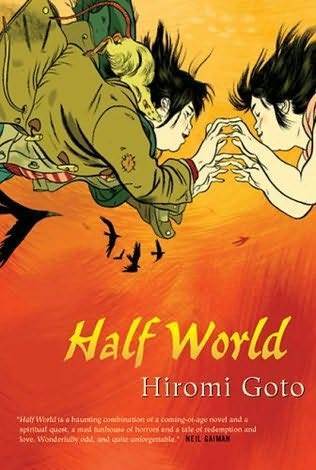 Have you ever stopped reading a book because you couldn't bear for it to end? That was my experience reading Hiromi Goto's Half World. I was on the train and I was totally absorbed in the narrative—would Melanie make it across the bridge of crows? Would she find the nerve to bite off the baby's finger to pay the toll and open the portal? This book is intense—yet it's also funny at times, and poignant at others. Melanie hasn't been all that happy in her fourteen years of life: her single mother's weak, unable to work for long, and eventually turns to alcohol; the mean girls at school chase her through the street and hurl rotten fruit at her; she's never known her father, and her only companions are the many crows that flock to the coast of British Columbia in search of food. Ms. Wei, a local storeowner, offers Melanie shelter from the bullies and food for her family's empty fridge—and when Melanie's terrifying adventure begins, it is Ms. Wei who offers a gift that sustains the teen through her many trials (Jade Rat). I don't want to give anything away, but if you're looking for a novel about a teenage girl who is empowered and made more compassionate by her own suffering—this is the book for you! Sacrifice is a major theme in the book, and in a recent interview with Ari, Goto assured readers that a sequel is underway…
Have you ever stopped reading a book because you couldn't bear for it to end? That was my experience reading Hiromi Goto's Half World. I was on the train and I was totally absorbed in the narrative—would Melanie make it across the bridge of crows? Would she find the nerve to bite off the baby's finger to pay the toll and open the portal? This book is intense—yet it's also funny at times, and poignant at others. Melanie hasn't been all that happy in her fourteen years of life: her single mother's weak, unable to work for long, and eventually turns to alcohol; the mean girls at school chase her through the street and hurl rotten fruit at her; she's never known her father, and her only companions are the many crows that flock to the coast of British Columbia in search of food. Ms. Wei, a local storeowner, offers Melanie shelter from the bullies and food for her family's empty fridge—and when Melanie's terrifying adventure begins, it is Ms. Wei who offers a gift that sustains the teen through her many trials (Jade Rat). I don't want to give anything away, but if you're looking for a novel about a teenage girl who is empowered and made more compassionate by her own suffering—this is the book for you! Sacrifice is a major theme in the book, and in a recent interview with Ari, Goto assured readers that a sequel is underway…








December 20, 2010
changing the game
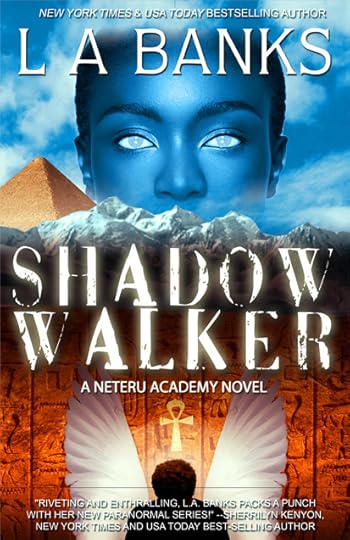 What I love most about self-publishing is the way it empowers creators everywhere—no more waiting for the "official" stamp of approval, and self-publishing no longer equals "substandard." John Edgar Wideman has self-published, and earlier this month LA Banks announced that she is self-publishing her new series of YA books. Emerging and established authors are realizing that they don't have to stand in line to be rejected and/or treated shabbily by big publishing houses. Small presses are looking better and better, and digital publishing offers even more options for authors. This morning I found an article on Publishers Weekly that announced the triumphant emergence of Citizen Authors: "determined, motivated, fed up." The article is written by Arielle Eckstut and David Henry Sterry, authors of the recently released Essential Guide to Getting Your Book Published; I was interviewed for that book and I'm included in the PW article:
What I love most about self-publishing is the way it empowers creators everywhere—no more waiting for the "official" stamp of approval, and self-publishing no longer equals "substandard." John Edgar Wideman has self-published, and earlier this month LA Banks announced that she is self-publishing her new series of YA books. Emerging and established authors are realizing that they don't have to stand in line to be rejected and/or treated shabbily by big publishing houses. Small presses are looking better and better, and digital publishing offers even more options for authors. This morning I found an article on Publishers Weekly that announced the triumphant emergence of Citizen Authors: "determined, motivated, fed up." The article is written by Arielle Eckstut and David Henry Sterry, authors of the recently released Essential Guide to Getting Your Book Published; I was interviewed for that book and I'm included in the PW article:
What's perhaps most exciting about Citizen Authors is that some of them have been able to say a big "I told you so!" to Manhattan publishing after having been rejected, mocked, and/or dismissed by that clique's elitism, solipsism, and/or lack of creative vision. These include people like Zetta Elliott, J.A. Konrath, and Lisa Genova. Zetta wrote about race in a way that didn't fit into the credo of the mostly white world of publishing, but fit perfectly into libraries all over the country that catered to children of every color…
The irony is, when Citizen Authors prove how valuable they are, all the big guns in the book business come running, throwing money. Even more ironic is that these Citizen Authors saw the marketplace in a clear-eyed, smart way that "big publishing" wouldn't or couldn't.
To my knowledge, only the Brooklyn Public Library and the NYPL acquired Wish when it was first self-published in 2008/2009, and we're still working on getting libraries across the country to add Wish to their collections. One of the biggest challenges faced by self-published authors is marketing—not just getting the word out, but getting book buyers to look in nontraditional places for book reviews and recommendations. If you're not reviewed in School Library Journal, Booklist, Kirkus, or PW, many important institutional book buyers won't even know you exist. The blogosphere was my best friend as a self-published author, but I meet educators all the time who still express amazement when they learn I have a YA novel in addition to my traditionally published picture book, Bird.
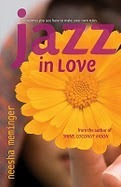 But I have no regrets about self-publishing and plan to do it again; it's reassuring to know that you don't have to take whatever the big houses are offering (when they offer anything at all), and I've had a great experience working with AmazonEncore. I'd work with them again in a heartbeat, but I haven't given up on traditional publishers and small presses, and encourage other aspiring authors to keep their options OPEN. Take risks and be willing to work for what you believe in…which brings me to Neesha Meminger, the latest YA author to start her own imprint and take charge of her publishing career. Have you seen the great new trailer for Neesha's new novel? You can view it here, and the book is now available online—just in time for the holidays!! Get your copy of Jazz in Love at Amazon.com, (Amazon.ca if you're in Canada), Barnes & Noble, and indie bookseller Boone Bridge Books. Neesha has agreed to do an interview for my blog, so stay tuned for details about her exciting adventure…
But I have no regrets about self-publishing and plan to do it again; it's reassuring to know that you don't have to take whatever the big houses are offering (when they offer anything at all), and I've had a great experience working with AmazonEncore. I'd work with them again in a heartbeat, but I haven't given up on traditional publishers and small presses, and encourage other aspiring authors to keep their options OPEN. Take risks and be willing to work for what you believe in…which brings me to Neesha Meminger, the latest YA author to start her own imprint and take charge of her publishing career. Have you seen the great new trailer for Neesha's new novel? You can view it here, and the book is now available online—just in time for the holidays!! Get your copy of Jazz in Love at Amazon.com, (Amazon.ca if you're in Canada), Barnes & Noble, and indie bookseller Boone Bridge Books. Neesha has agreed to do an interview for my blog, so stay tuned for details about her exciting adventure…
The self-publishing experiment only works if people take a chance and support books that are coming out of nontraditional sources. So please do support these authors and remember: if things were equal, they wouldn't need to be separate.








December 19, 2010
when you're strange
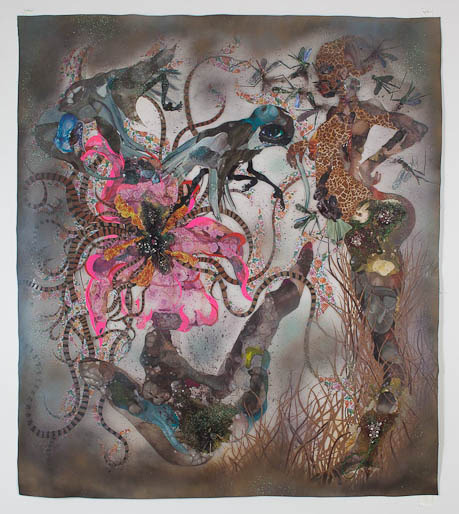 I don't often go into Manhattan, but ever since Sandra Payne mentioned on Facebook that there was a new exhibit by Wangechi Mutu, I knew I needed to check it out. I first saw Mutu's work at the Brooklyn Museum—I think one of her pieces was included in the 2007 "Global Feminisms" exhibit. Yesterday might not have been the best day for me to look at art; I've got a new novel percolating in my brain, and I just started reading Hiromi Goto's Half World. Add hormones to the mix and I probably should have stayed at home! But it was the last day of the exhibit ("Hunt, Bury, Flee") at the Barbara Gladstone Gallery, and I saw on Facebook that Wangechi Mutu would be giving a talk at 2pm. Nicole, who blogs at The Hotness, organized and announced the talk but when I called the gallery that morning to confirm the time, I was told the talk "might not be open to the public." The gallery would be open while the talk was conducted, however, so I was encouraged to come by and listen in. Turns out Nicole had something different in mind—a very open, informal conversation with Mutu followed by a video screening and refreshments upstairs. Unfortunately, I didn't make it to the end. After half an hour of perusing the dozen or so works of art on my own, my head was already full of words that needed to be written down; then a certain personality started to dominate the discussion and so I moved to the edge of the group and then left after about an hour. I don't have the best social skills; I'm used to hitting MUTE on my remote when someone's speech annoys me or I simply surf to another channel. But group dynamics are tricky and if I'm not the professor at the head of the classroom, then I'm part of the captive audience. I should have stayed, but have enough to say about the two pieces Mutu discussed. We started with Humming, pictured above, and Nicole read aloud a list of words that Mutu associates with her work; one was a Swahili term for a process of utilitarian recycling of discarded items. Mutu pointed out that in developing countries, recycling isn't a matter of dealing with (the guilt of) excess; rather it's a necessary project whereby poor people render useful those things which others have thrown away. Old tires are turned into sandals, for example, and I thought of El Anatsui's use of wooden market platters and discarded bottle caps. Mutu talked about how children use wire and aluminum cans to make toys, and I thought of my boys doing just that in "Muñecas." Then she explained how this informs her own creative process, even leading her to reshape pornographic images of black women's bodies. I asked how she understood the term "organic" but didn't properly explain my intent; it's ironic that I'm drawn to black feminist art because I'm a black feminist, and yet was concerned about taking up too much space in that moment (some men in the group didn't have that problem). In the US, "organic" signifies a kind of purity—and privilege. Organic fruits and vegetables are more expensive, and yet look less appealing sometimes—less robust and imperfect because they aren't "protected and preserved" by chemicals. When I talk about wanting my writing to be organic, I think about an absence of interference—no external editor telling me to do this or change that. For Mutu, "organic" means allowing creation to unfold naturally; since having a child, she's learned not to force or try to control things. I imagine collage takes a great deal of patience, especially when working against perfection and symmetry. Mutu's pieces are absolutely fascinating; her women are distortions, their bodies fragmented, broken yet repaired or forced to cohere by adhesions—mechanical bits, parts of motorcycles or other machines, the hides of wild animals. Mutu inserts symbols of delicate beauty—butterflies,
I don't often go into Manhattan, but ever since Sandra Payne mentioned on Facebook that there was a new exhibit by Wangechi Mutu, I knew I needed to check it out. I first saw Mutu's work at the Brooklyn Museum—I think one of her pieces was included in the 2007 "Global Feminisms" exhibit. Yesterday might not have been the best day for me to look at art; I've got a new novel percolating in my brain, and I just started reading Hiromi Goto's Half World. Add hormones to the mix and I probably should have stayed at home! But it was the last day of the exhibit ("Hunt, Bury, Flee") at the Barbara Gladstone Gallery, and I saw on Facebook that Wangechi Mutu would be giving a talk at 2pm. Nicole, who blogs at The Hotness, organized and announced the talk but when I called the gallery that morning to confirm the time, I was told the talk "might not be open to the public." The gallery would be open while the talk was conducted, however, so I was encouraged to come by and listen in. Turns out Nicole had something different in mind—a very open, informal conversation with Mutu followed by a video screening and refreshments upstairs. Unfortunately, I didn't make it to the end. After half an hour of perusing the dozen or so works of art on my own, my head was already full of words that needed to be written down; then a certain personality started to dominate the discussion and so I moved to the edge of the group and then left after about an hour. I don't have the best social skills; I'm used to hitting MUTE on my remote when someone's speech annoys me or I simply surf to another channel. But group dynamics are tricky and if I'm not the professor at the head of the classroom, then I'm part of the captive audience. I should have stayed, but have enough to say about the two pieces Mutu discussed. We started with Humming, pictured above, and Nicole read aloud a list of words that Mutu associates with her work; one was a Swahili term for a process of utilitarian recycling of discarded items. Mutu pointed out that in developing countries, recycling isn't a matter of dealing with (the guilt of) excess; rather it's a necessary project whereby poor people render useful those things which others have thrown away. Old tires are turned into sandals, for example, and I thought of El Anatsui's use of wooden market platters and discarded bottle caps. Mutu talked about how children use wire and aluminum cans to make toys, and I thought of my boys doing just that in "Muñecas." Then she explained how this informs her own creative process, even leading her to reshape pornographic images of black women's bodies. I asked how she understood the term "organic" but didn't properly explain my intent; it's ironic that I'm drawn to black feminist art because I'm a black feminist, and yet was concerned about taking up too much space in that moment (some men in the group didn't have that problem). In the US, "organic" signifies a kind of purity—and privilege. Organic fruits and vegetables are more expensive, and yet look less appealing sometimes—less robust and imperfect because they aren't "protected and preserved" by chemicals. When I talk about wanting my writing to be organic, I think about an absence of interference—no external editor telling me to do this or change that. For Mutu, "organic" means allowing creation to unfold naturally; since having a child, she's learned not to force or try to control things. I imagine collage takes a great deal of patience, especially when working against perfection and symmetry. Mutu's pieces are absolutely fascinating; her women are distortions, their bodies fragmented, broken yet repaired or forced to cohere by adhesions—mechanical bits, parts of motorcycles or other machines, the hides of wild animals. Mutu inserts symbols of delicate beauty—butterflies, 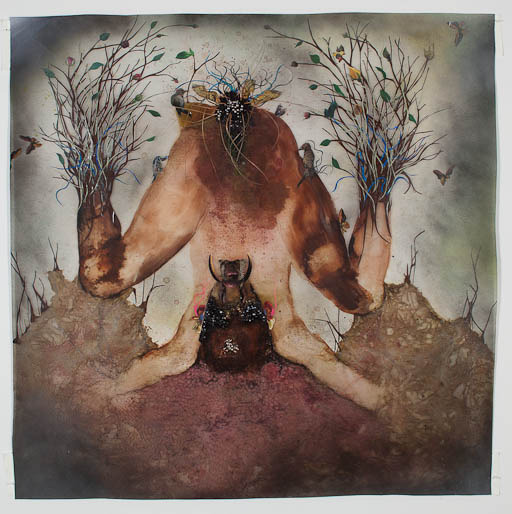 dragonflies, hummingbirds—into scenes that hint of environmental disaster. One black woman seems to dissolve into an oily mass reminiscent of the recent BP spill in the Gulf. Dragonflies have long black legs and so become mosquito-like and menacing; between a woman's splayed legs we find pearls buried in soil, and from the soil sprouts dry weed-like strands (Sprout, at right). I immediately thought of the saying, "Never cast pearls before swine," and then I thought of my own little art project and how hard I work to keep things even and pristine. It takes courage and daring to mix materials the way Mutu does—is she redeeming black female sexuality by representing the body in this organic way? After seeing endless airbrushed images of the black female body, this does seem closer to "the truth." While she was discussing Humming, this white man walked through the group and planted himself right in front of the image (!!!). Then turned and walked away….I don't particularly want HIS gaze on these images, though it was interesting to hear Mutu say that in majority-black countries (she's Kenyan) the dictators are black and the poor people are black, too; race isn't what distinguishes one person from another. I like that her work implicates other blacks in the
dragonflies, hummingbirds—into scenes that hint of environmental disaster. One black woman seems to dissolve into an oily mass reminiscent of the recent BP spill in the Gulf. Dragonflies have long black legs and so become mosquito-like and menacing; between a woman's splayed legs we find pearls buried in soil, and from the soil sprouts dry weed-like strands (Sprout, at right). I immediately thought of the saying, "Never cast pearls before swine," and then I thought of my own little art project and how hard I work to keep things even and pristine. It takes courage and daring to mix materials the way Mutu does—is she redeeming black female sexuality by representing the body in this organic way? After seeing endless airbrushed images of the black female body, this does seem closer to "the truth." While she was discussing Humming, this white man walked through the group and planted himself right in front of the image (!!!). Then turned and walked away….I don't particularly want HIS gaze on these images, though it was interesting to hear Mutu say that in majority-black countries (she's Kenyan) the dictators are black and the poor people are black, too; race isn't what distinguishes one person from another. I like that her work implicates other blacks in the 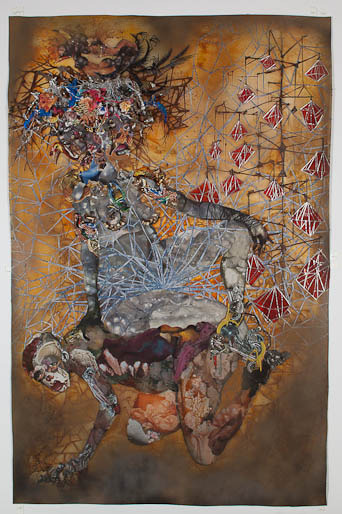 violation and exploitation of black women. The next piece we discussed, I Sit, You Stand, They Crawl, made me think of another post I saw on Facebook recently that featured a quote by US Secretary of State, Madeleine Albright: "There's a special place in hell for women who don't help other women." That's essentialist thinking, of course, though I often subscribe to it myself. I do expect more of other women and am more disappointed when they fail to come through. I was watching To the Contrary yesterday morning and the women panelists were discussing a new report that shows women *mentor* other women but don't seem to *sponsor* them. In other words, "I'll show you the ropes, but I'm not helping you climb this ladder." What does that say about women in the workplace? They're too busy, too overwhelmed by their responsibilities to promote other women? Or do they simply suffer from that human flaw that makes dominance pleasurable, the ability to control another's movements and/or block her progress: "I may not be able to break through this glass ceiling, but I'm sure as hell going to sit on top of all these other bi***es." I just had that conversation with a writer friend who finds one particular elder only recommends mediocre young professionals so that his status remains unchallenged. Ugly! Organic? Is this who we are when we strip back the facade of politeness—that fake niceness women so often perform? Ok, I could go on but I'd better get back to this new novel. If you get the chance to see Mutu's work, take it! She's got exhibits all over the world…
violation and exploitation of black women. The next piece we discussed, I Sit, You Stand, They Crawl, made me think of another post I saw on Facebook recently that featured a quote by US Secretary of State, Madeleine Albright: "There's a special place in hell for women who don't help other women." That's essentialist thinking, of course, though I often subscribe to it myself. I do expect more of other women and am more disappointed when they fail to come through. I was watching To the Contrary yesterday morning and the women panelists were discussing a new report that shows women *mentor* other women but don't seem to *sponsor* them. In other words, "I'll show you the ropes, but I'm not helping you climb this ladder." What does that say about women in the workplace? They're too busy, too overwhelmed by their responsibilities to promote other women? Or do they simply suffer from that human flaw that makes dominance pleasurable, the ability to control another's movements and/or block her progress: "I may not be able to break through this glass ceiling, but I'm sure as hell going to sit on top of all these other bi***es." I just had that conversation with a writer friend who finds one particular elder only recommends mediocre young professionals so that his status remains unchallenged. Ugly! Organic? Is this who we are when we strip back the facade of politeness—that fake niceness women so often perform? Ok, I could go on but I'd better get back to this new novel. If you get the chance to see Mutu's work, take it! She's got exhibits all over the world…








December 18, 2010
bark
I was heading to the library yesterday and thought I'd save time by walking up Flatbush instead of meandering through the garden. And then I thought, "What's the rush?" The garden's free in the wintertime, and it's also usually empty, which is the best part. Everything slows down when I pass through the black iron gates, and suddenly instead of running though my list of things to do, I started hearing voices…it's the trees that do it, you know. Now that they're stripped of their leaves there's so much more to see—the texture of bark on their trunks, the abandoned birds' nests high up in the bare branches. Put me next to a couple of trees and all of a sudden my mind's gone off and I'm no longer just myself in my body in the city/garden/park; I'm in a story, in someone else's life, their world. Last spring I was walking along the border of Prospect Park and I heard a strange rustling in the leaves; I stopped on the street and met these three characters who now have names: Hakim, Nyla, and D. Yesterday I walked through the garden and at least three scenes unfolded before my eyes. And it all stopped once I left the garden. I went to the library, found the book I wanted, talked to my favorite library people, and then headed back to Flatbush in search of a Christmas tree. But I kept hearing an echo of the kids' voices. Really I was saying their words over and over again so I wouldn't forget:
"Why me?"
"Because you have nothing to lose."
"What?"
"No one to lose, I mean. It's best to choose someone whose heart is free."
I want to object, to insist that I do have something—someone—to lose. But the bird is right.
There's a talking bird, of course—a crystal bird that morphs into other forms but first appears as a bird because D is an avid birdwatcher. She chooses him because D seems to be a loner, but once he starts tutoring Hakim—8th grade basketball star—D ceases to be alone. He's got a protector and competition for the affection of Nyla, a sassy 7th grader who seems to be the only girl at their school who isn't swooning over Hakim. Anyway, I'm writing out a plot synopsis now, except I'm pausing to write snatches of dialogue and next thing I know I've got a page of brand new writing…which would normally be a good thing except I'm not done Judah's Tale yet…it's all because I found that second cowrie shell. And you know they found the remains of a boat while they were excavating the Ground Zero site…it's all coming together. The boulder in the park, the hologram, the cowrie shells, the African Burial Ground. Every souls wants to go home…








December 17, 2010
follow the leader
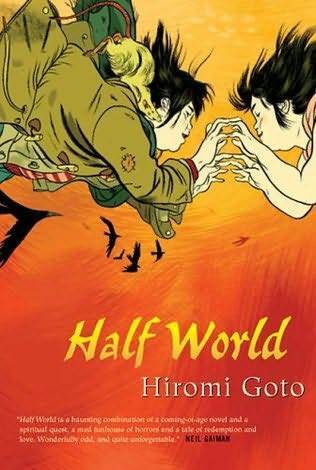 Ari's got some awesome posts up, including an interview with Japanese Canadian author Hiromi Goto at Color Online. I especially loved this response, which made me want to read ALL her work:
Ari's got some awesome posts up, including an interview with Japanese Canadian author Hiromi Goto at Color Online. I especially loved this response, which made me want to read ALL her work:
I'm a woman of colour writing out of North America. I'm an immigrant living on colonized land. This awareness effects, absolutely, how I write, because I'm not writing out of a historical vacuum. In literary historical terms, the writings of women of colour and indigenous women has not been widely published in North America for so very long. I'm talking about air time. It's been dominated by white male writers, and when I look at the winners of major literary prizes, it still veers toward them. This tells me something about long-term systemic racism and sexism. I believe that it's still vital and necessary, for the good of all, that diverse and politicized women of colour and indigenous women writers continue to roar, take up space, and challenge the normative. That readers need, and are hungry for, diverse stories. Sometimes our bodies and minds are starving for other stories, but we do not know it, because we are full-up on Wonderbread.
Don't forget that Ari's running a series—Elated over Eleven—to introduce you to debut MG/YA authors of 2011. Today's author is Danette Vigilante, author of The Trouble with a Half Moon. Previous interviews include Sarah Jamila Stevenson and Christopher Grant.
Nnedi Okorafor's got an update on her blog about her forthcoming YA novel, Akata Witch. And her adult novel, Who Fears Death, is making a lot of "best of" lists, so consider giving it as a gift for the holidays…








December 16, 2010
petering out
I'm running out of creative steam! But will browse through the craft store today and see what tricks of the trade I can try to embellish these final pages (which are not in order).








December 15, 2010
making it plain
After my last post, I realized I could do a better job presenting my rationale for this diversity symposium in Canada. I think I'll send out the outline again with this additional preamble. Since no guests have officially been invited, I've removed the names of suggested participants.
"Still Searching for Mirrors:
Multicultural Children's Literature in Canada"
As a black Canadian author who writes and publishes in the US, I have often wondered how the two industries compare when it comes to publishing diverse titles for young readers. With the help of several other black book bloggers here in the US, I recently compiled a list of the middle grade (MG) and young adult (YA) titles published by black authors in 2010; to my surprise, we came up with almost sixty titles and so I decided to compile a similar list for Canada. Unfortunately, I was only able to find ONE black-authored novel for teen readers published in Canada in 2010. This is in keeping with statistics I compiled earlier in the year (blog post #1, blog post #2) that show Canadian presses publish only a handful of black authors each year:
Children's Books By and About Black People
Published in Canada
2000-2009
Year
Number of English-Language Books
Received
at CCBC*
African / Caribbean
African Canadian
By
About
2009
500
5
19
2008
500
4
12
2007
500
2
14
2006
500
4
12
2005
500
3
6
2004
500
2
13
2003
500
2
5
2002
500
2
5
2001
500
2
6
2000
500
2
2
*the Canadian Children's Book Centre
Just as troubling as the low number of published black authors is the fact that in the past ten years, there seem to be no MG/YA novels that feature a black protagonist and take place in contemporary Canada. These (unscientific) findings led me to ask the following questions:
1. Why are so few black authors being published in a country that claims to value multiculturalism?
2. Are other racial groups better represented in Canadian children's publishing? If so, what can we learn from their success?
3. How many people of color are employed in the publishing industry in Canada?
4. What impact does the lack of contemporary black fiction have on young readers in Canada?
5. What can be done to increase the number of authors and the range of stories being told about people of African descent?
To encourage discussion and develop an agenda for change, I am proposing a one-day symposium to address the issue of diversity in Canadian children's publishing. My participation in the inspiring conference, A Is for Anansi, at NYU this past fall convinced me that this is a conversation Canadians also need to have.
Agenda:
Keynote Address: Who is the authority on this topic?
Panels:
1. Multicultural Children's Literature in Canada: How Far Have We Come?
2. Responding to Racism in the Canadian Publishing Industry
3. Books at Home/Books at School: Searching for a Mirror
4. How to Write/Publish for Young Readers
Concluding remarks: Creating an agenda for change
If you'd like to offer suggestions and/or help in the planning of this event, please leave a comment.










